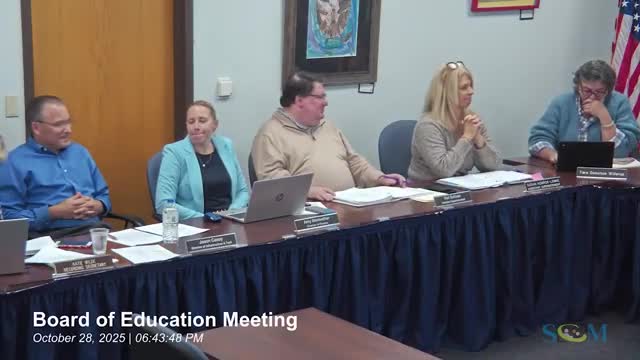Henry James reports modest test gains, outlines IXL rollout and culture changes
Get AI-powered insights, summaries, and transcripts
Subscribe
Summary
Henry James Middle School principal Scott told the board the school posted modest statewide test gains and outlined a shift to teacher-assigned IXL skills, stronger vertical team work and a cell-phone locker policy that staff said improved school climate.
Henry James Middle School principal Scott (Henry James principal) told the Simsbury Board of Education that the school recorded modest gains on this year's Smarter Balanced assessments and described a number of curriculum and culture initiatives intended to sustain improvement.
'We had the first New England Math League contest, which had 189 students participate, which is an SHS record for participation,' Scott said, noting both extracurricular success and classroom progress. Schoolwide, he reported about 75 percent of students met or exceeded expectations in English language arts (a 2 percent increase), 73.1 percent did so in science (a 1.7 percent decline), and 66 percent met or exceeded math benchmarks (a 6 percent increase overall for the school).
Those headline results were accompanied by more detailed cohort data. Scott said seventh grade showed a notable increase in ELA (78.5 percent at or above), which the school described as the first sustained post-COVID increase from sixth to seventh grade they'd seen in many years. By contrast, some eighth-grade comparison rankings moved lower by a few percentage points; the report stressed those cohorts remain within a close range of peer districts.
Why it matters: the school tied its assessment outcomes to targeted instructional work. Scott said Henry James implemented a multi-part math improvement plan that included 'building thinking classrooms' strategies, vertical team visits with elementary grades, focused PLC analysis of assessment data and after-school review sessions. Those practices, Scott said, helped drive the stronger seventh-grade results.
Staff also described an expanded use of the IXL platform. Scott and Jacqueline (Henry James staff member) said the district moved away from a free-form '30 minutes of practice' expectation toward teacher-assigned skills tied to current units. 'Last year we had students just log 30 minutes of practice' Scott said. 'We moved it to assign skills, so the teachers actually pick the skill they want the students to work on' with an 80 percent proficiency requirement for completion.
School leaders said IXL is being used both diagnostically and formatively: students take diagnostics that identify grade-level gaps (the school calls that the 'arena'), weekly arena practice provides targeted skill work, and the platform's data follow students into ninth grade so high-school teachers can see prior gaps. Jacqueline cautioned the platform is not a replacement for classroom instruction: 'What it is not is a replacement for expert classroom instruction,' she said.
Culture, supports and student wellbeing: the school highlighted the first full-year implementation of a cell-phone 'off and away' locker policy. Jacqueline said the change reduced in-class phone incidents, decreased interruptions at lunch and improved students' presence in class. Climate survey results presented to the board showed increases in perceived safety and belonging; staff reported strong buy-in for the new policies.
The presentation also covered family engagement and student supports. Scott described parent-teacher conferences run through the Connections teacher model (where students keep the same connections teacher for continuity) and a new study-skills booklet developed by staff. The booklet will be used across the year and the leadership team plans to present it at PTC meetings; board members suggested distributing a version to incoming sixth graders.
Staff recognition and community response: Principal Scott introduced a staff recognition for Laurel (Henry James art teacher), who was highlighted for mentoring arts students and new teachers. Laurel told the board: '31 years I've been teaching here and I really love' and emphasized the importance of student-created work and the arts program's contributions to student achievement.
The school also described a community response after the loss of a student and a beloved teacher the prior year. Scott and Jacqueline described a memorial program built around LEGO donations that engaged the full student body and student council, collected messages for the family, and produced ongoing displays and a fundraising effort in the student's memory.
What the board asked: trustees probed the differences in math outcomes for Algebra I students versus Math 8 and whether curricular choices left gaps (for example, geometry standards covered unevenly in some Algebra I sequences). Scott and other staff said they are using IXL data to identify missing prerequisite skills and to design targeted instruction for algebra students.
Bottom line: Henry James presented a mix of modest overall assessment gains, several instructional changes (IXL, vertical teaming and PLC emphasis) and measurable improvements in school climate tied to clear behavioral expectations. The school requested continued attention to vertical alignment and to monitoring IXL implementation so the platform informs teacher practice without supplanting classroom instruction.
Votes and formal actions tied to the presentation: none taken on curriculum or staffing during the report.
